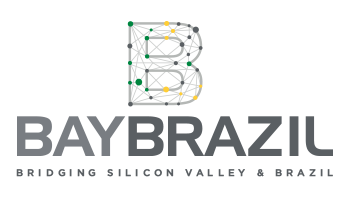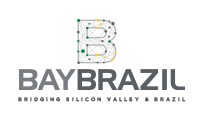Brazilian entrepreneur Carlos Pereira, CEO and Founder of Livox, is among the laureates of The Tech for Global Good.
The program recognizes innovators solving the world’s biggest problems. This year’s focus is Technology & Health and Livox was included for being a software platform that enables non-verbal disabled people to communicate and learn.
Carlos’s work has received awards such as The Best Inclusion Software in the World, by the UN; Technological Innovation with the Greatest Impact by Inter-American Development Bank, Social Entrepreneur of 2017 by Schwab Foundation.
BayBrazil: Livox was recognized as one of the 2017 Tech Laureates, by The Tech Museum. Tell us about this recognition.
Carlos: I received a phone call from Leslie Zane from the Tech Awards explaining that I was selected as one of the laureates. I was really excited about this opportunity specially because it’s a privilege to be selected as one of the companies that is using technology to improved people’s lives.
BayBrazil: You were inspired by your daughter who has Cerebral Palsy due to a medical mistake during labor. When you developed the app, were you planning to extend the solution in high scale?
Carlos: Absolutely! I saw the transformation in my daughter’s life when she started using Livox and I thought that more people needed and deserved the same. Since from the very beginning I wanted this to be a global solution.
BayBrazil: Give us an overview of the product and its market.
Carlos: Livox is an alternative communication software that enables non-verbal disabled people to communicate and to learn. It is quite unique since it has several intelligent algorithms that makes it to adjust itself according to the user’s disability. Our market a non-verbal people with a wide range of diseases and disabilities that prevent them from speaking. They can be people with Cerebral Palsy, Autism, Down Syndrom, ALS, Stroke Sequelae and many diseases and disabilities that might affect the speech process.
BayBrazil: How was your entrance in other countries?
Carlos: In 2015 we were awarded by the United Nations as the Best Inclusion App in the World. Right after the award ceremony a “sheik” looked for me and said he wanted to distribute our software in the Middle East. I traveled to Saudi Arabia twice and we worked with them to localize the software into Arabic. We already have licenses being sold in Djibouti (a small country in North Africa) as well as Egypt and Jordan. In 2016 I moved to the US after my company received an investment from Google and we started working with the Florida Hospital in Central Florida. Right now our software is already being used in 5 out of 7 facilities of this hospital in Central Florida.
BayBrazil: Tell us about Lixox’s partnership with Google.
Carlos: In 2015 Google invited us for their annual event in San Francisco, Google IO. Here is a link to our participation. After this they asked me what new things we were working on. I told them about a new technology that we were creating that enables people with disabilities to communicate up to 20 times faster using Machine Learning and Natural Language Process. After some discussion we received a $550,000 grant from Google.org to continue improving this technology.
BayBrazil: How hard is to deal with donation versus profit? Is the nonprofit “Inclusion Without Borders” a way to deal with it?
Carlos: Livox International LLC is a for profit company however it always bothered me that thousands and thousands of people with disabilities desperately need a technology like Livox but they don’t have money to buy not even a meal. So, for this reason we created our nonprofit arm, Inclusion Without Borders to make not only Livox but any technologies for people with disabilities more affordable or for free. So, those who can afford can get their Livox through our for profit company and those who can’t afford, will receive it through our nonprofit organization.
BayBrazil: Is social entrepreneurship more challenging than a business oriented entrepreneurship?
Carlos: Sometimes yes because specially in Brazil social enterprises are kind of a new thing. This means that many people see them as a wrong thing to make money and make good at the same time. Anyway in my point of view is quite rewarding to make good and also to make some money out of it.
BayBrazil: How about being an entrepreneur in Brazil? Do you think it would be easier for you in another country?
Carlos: I believe that every entrepreneur in Brazil deserves a medal. It’s really not easy to be an entrepreneur in Brazil. High taxes, lots of bureaucracy make it almost impossible in Brazil. I am living in the U.S. for one year now and it’s very clear to me that the environment for creating a company here is way better than in Brazil. Anyway, I am very optimistic that Brazil may in the future be an entrepreneur-friendly environment as well.
BayBrazil: Did you have support to build the company? What were the biggest constrains in your entrepreneur career?
Carlos: My biggest support came from my family. Aside from that, I had some amazing friends who also helped me by donating their time to help me improve the software. Issues: my biggest problem was to create something that really works in the hands of people with disabilities. This is not a small task. We had to pay close attention to the needs of hundreds of different disabilities and then transform this into algorithms.
BayBrazil: Does having government as client make things harder?
Carlos: Actually, no. It’s harder to sell to governments but it’s also a kind of sale that is in bulk so you can reach much more people faster.
BayBrazil: What are the next goals for the company? Do you have plans of developing new products?
Carlos: We are continuing to develop new algorithms to make Livox faster and to make it available to a wider range of disabilities. For example, we just released a new version that people with no motor control can use Livox with their eyes. It’s our goal to develop new technologies for people with disabilities through our nonprofit arm as well.
BayBrazil: Would you be an entrepreneur if you didn’t have a personal motivation?
Carlos: Probably I wouldn’t be. I also believe that a personal motivation is a very good drive for accomplishing great things. There’s nothing more powerful than that. No money or award is more powerful than a personal motivation.
BayBrazil: Do you think the prize as reward or a way to reach even more users?
Carlos: I think it’s both but what I am looking for is to reach more people with my technology.









